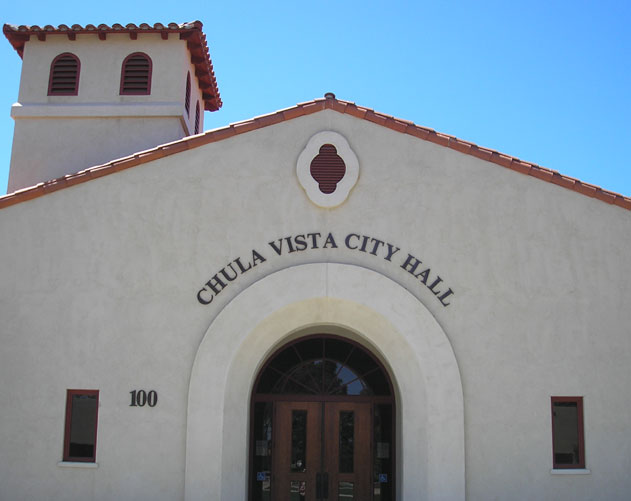On July 27, city staff presented the Chula Vista City Council with two proposed resolutions that would bring amendments to the City Charter to the people to vote on one or two ballot measures in the upcoming November elections.
The cost to the city for one comprehensive measure with a link to draft on the city’s website is $195,000. Any additional shorter measures costs $165,000. As the City Clerk’s office has no funding for these ballot measures, Council must also vote on funding the ballot measures.
Over the past year, with input from city departments, in particular the City Clerk and the City Attorney’s office, the Charter Review Commission has undertaken an extensive review of the entire Charter. On July 12, the CRC presented draft Charter changes to Council, received feedback, and presented the updated version on July 27.
City Attorney Glen Googins divided up the changes in three levels. Level 1 is non-substantive, corrections, clarifications, elimination of redundancy, and reorganization. Level 2 in minimally substantive, reflects changes in law, technology, best practices, and would not alter current City practices or the general intent of existing Charter provision. Level 3 is more substantive, mostly derived from previous Council referrals or recommended by the Charter Review Committee presented to Council in 2020.
“Important for context, consider that the last truly comprehensive update of the charter occurred in 1978,” he said. “A lot has changed since then. Legal changes and how cities conduct business.”
City Council unanimously agreed to retain the changes in Levels 1 and Level 2, but there was much discussion on the items in Level 3. Staff will bring back an amended proposal on Aug. 9, adding in the consensus of council members on certain changes to chapters in Level 3.
After questions and discussion, Council went through each item in Level 3, and voted whether to accept the changes, or have staff come back with amendments to changes.
Level 3 changes: Board & Commission Membership Requirements, Suspension of Elected Officials with Felony Charges Pending, City Attorney Residency and Experience Requirements, Coverts Legislative Council Provisions to Conflict Council Provisions, and Mail in Ballot System for Special Election.
Council member Steve Padilla said he thinks the city’s structure of the Charter needs more of an overhaul than what was presented.
“Structure of government is immature for the nature and size of our community,” he said. “It is designed for a small town, part-time engaged council when the demands are something entirely different. It has no real infrastructure built into it to support the legislative function of the elected city council.”
Padilla said there needs to be requirements set in the residency of people running for office. In the Charter, there is no limitations on residency for people running for office other than being a registered voter. But Padilla said residency requirements should “mirror” state legislative residency requirements.
Deputy City Attorney Megan McClurg said after research, even though state elections have residency requirements, that city elections do not. She said the California Supreme Court has sided that in cities, residency is tied too closely with voting rights, and has ruled against cities on that basis. But Council asked staff to come back with some residency requirements with candidates living in the city for at least one year.
Googins cautioned the mayor on doing this but added that if some part of the charter is found to be illegal, it will not affect the rest of the charter changes. The motion to add residency in elections to the Charter passed with Council member Jill Galvez voting no.
Council member John McCann motioned Board & Commission Membership Requirement, which changes from qualified elector requirement to residency requirement for most boards and commissions. It passed with McCann voting no.
Padilla motioned to strike the language in Suspension of Elected Officials with Felony Charges Pending, passing unanimously. The language would allow Council to vote suspending a member of council if they were pending felony proceedings.
Major discussion was the ambiguity of the determination of the seriousness of the charges, and that it could be used as a political tool. In the language, a council member could be suspended without pay by a city council vote, keeping benefits, and getting backpay if not convicted.
“I am a very big believer in the process of law,” said Padilla. “I also believe in trusting our system and holding our elected officials to higher standards. I also believe in trusting our system…ultimately placing the power of this kind of decision in the hands of the people…I do not think that is the City Council’s role…This is a very dangerous, slippery slope.”
Galvez motioned to strike out Converts Legislative Council Provisions to Conflict Council Provision that maintains an alternative legal advisor to Council when the city attorney has a conflict of interest but limits to situations where conflict actually exist. The motion passed.
McCann motioned to accept Mail in Ballot System for Special Elections language. The motion passed with Council member Andrea Cardenas and Mayor Mary Casillas Salas voting no.
Cardenas said special elections are poorly represented by voter turnout, and without a physical place within the city for people who may need help, or who prefer to vote in person, she believed it would make voter turnout even lower for special elections.
The mayor motioned to accept the language of City Attorney Residency and Experience Requirements, which would extend the experience requirement from seven years to 10 years in practice. That motion passed unanimously, although the mayor said she wanted municipal government experience added to the language.
The draft Charter now heads to the CRC, then to the City Attorney’s office, for a final vote for Charter changes and clear ballot language on Aug. 9. It was not determined if it would be one or two ballot measures. Aug. 9 is the latest date for Council to approve the amended charter in order to meet election deadlines. It must be at the Registrar of Voters by Aug. 12, said Googins.
A copy of the proposed amended Charter, as is, can be found at the city’s website in the July 27 City Council agenda, Item 7.2 (attachments).















